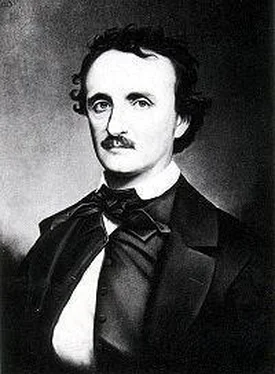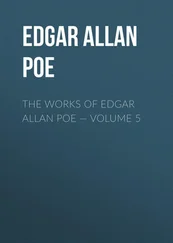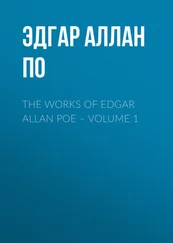Эдгар По - Works of Edgar Allan Poe
Здесь есть возможность читать онлайн «Эдгар По - Works of Edgar Allan Poe» весь текст электронной книги совершенно бесплатно (целиком полную версию без сокращений). В некоторых случаях можно слушать аудио, скачать через торрент в формате fb2 и присутствует краткое содержание. Жанр: Старинная литература, на английском языке. Описание произведения, (предисловие) а так же отзывы посетителей доступны на портале библиотеки ЛибКат.
- Название:Works of Edgar Allan Poe
- Автор:
- Жанр:
- Год:неизвестен
- ISBN:нет данных
- Рейтинг книги:4 / 5. Голосов: 1
-
Избранное:Добавить в избранное
- Отзывы:
-
Ваша оценка:
- 80
- 1
- 2
- 3
- 4
- 5
Works of Edgar Allan Poe: краткое содержание, описание и аннотация
Предлагаем к чтению аннотацию, описание, краткое содержание или предисловие (зависит от того, что написал сам автор книги «Works of Edgar Allan Poe»). Если вы не нашли необходимую информацию о книге — напишите в комментариях, мы постараемся отыскать её.
Works of Edgar Allan Poe — читать онлайн бесплатно полную книгу (весь текст) целиком
Ниже представлен текст книги, разбитый по страницам. Система сохранения места последней прочитанной страницы, позволяет с удобством читать онлайн бесплатно книгу «Works of Edgar Allan Poe», без необходимости каждый раз заново искать на чём Вы остановились. Поставьте закладку, и сможете в любой момент перейти на страницу, на которой закончили чтение.
Интервал:
Закладка:
* * *
No swellings tell that winds may be Upon some far-off happier sea-- No heavings hint that winds have been On seas less hideously serene."
It lacks the aerial melody of the poet whose heart-strings are a lute:
"And they say (the starry choir And the other listening things) That Israfeli's fire Is owing to that lyre By which he sits and sings-- The trembling living wire Of those unusual strings."
But The Raven , like "The Bells" and "Annabel Lee," commends itself to the many and the few. I have said elsewhere that Poe's rarer productions seemed to me "those in which there is the appearance, at least, of spontaneity,--in which he yields to his feelings, while dying falls and cadences most musical, most melancholy, come from him unawares." This is still my belief; and yet, upon a fresh study of this poem, it impresses me more than at any time since my boyhood. Close acquaintance tells in favor of every true work of art. Induce the man, who neither knows art nor cares for it, to examine some poem or painting, and how soon its force takes hold of him! In fact, he will overrate the relative value of the first good work by which his attention has been fairly caught. The Raven, also, has consistent qualities which even an expert must admire. In no other of its author's poems is the motive more palpably defined. "The Haunted Palace" is just as definite to the select reader, but Poe scarcely would have taken that subtle allegory for bald analysis. The Raven is wholly occupied with the author's typical theme--the irretrievable loss of an idolized and beautiful woman; but on other grounds, also, the public instinct is correct in thinking it his representative poem.
A man of genius usually gains a footing with the success of some one effort, and this is not always his greatest. Recognition is the more instant for having been postponed. He does not acquire it, like a miser's fortune, coin after coin, but "not at all or all in all." And thus with other ambitions: the courtier, soldier, actor,--whatever their parts,--each counts his triumph from some lucky stroke. Poe's Raven, despite augury, was for him "the bird that made the breeze to blow." The poet settled in New-York, in the winter of 1844-'45, finding work upon Willis's paper, "The Evening Mirror," and eking out his income by contributions elsewhere. For six years he had been an active writer, and enjoyed a professional reputation; was held in both respect and misdoubt, and was at no loss for his share of the ill-paid journalism of that day. He also had done much of his very best work,--such tales as "Ligeia" and "The Fall of the House of Usher," (the latter containing that mystical counterpart, in verse, of Elihu Vedder's "A Lost Mind,") such analytic feats as "The Gold Bug" and "The Mystery of Marie Roget." He had made proselytes abroad, and gained a lasting hold upon the French mind. He had learned his own power and weakness, and was at his prime, and not without a certain reputation. But he had written nothing that was on the tongue of everybody. To rare and delicate work some popular touch must be added to capture the general audience of one's own time.
Through the industry of Poe's successive biographers, the hit made by The Raven has become an oft-told tale. The poet's young wife, Virginia, was fading before his eyes, but lingered for another year within death's shadow. The long, low chamber in the house near the Bloomingdale Road is as famous as the room where Rouget de l'Isle composed the Marseillaise. All have heard that the poem, signed "Quarles," appeared in the "American Review," with a pseudo-editorial comment on its form; that Poe received ten dollars for it; that Willis, the kindest and least envious of fashionable arbiters, reprinted it with a eulogy that instantly made it town-talk. All doubt of its authorship was dispelled when Poe recited it himself at a literary gathering, and for a time he was the most marked of American authors. The hit stimulated and encouraged him. Like another and prouder satirist, he too found "something of summer" even "in the hum of insects." Sorrowfully enough, but three years elapsed,--a period of influence, pride, anguish, yet always of imaginative or critical labor,--before the final defeat, before the curtain dropped on a life that for him was in truth a tragedy, and he yielded to "the Conqueror Worm."
"The American Review: A Whig Journal" was a creditable magazine for the time, double-columned, printed on good paper with clear type, and illustrated by mezzotint portraits. Amid much matter below the present standard, it contained some that any editor would be glad to receive. The initial volume, for 1845, has articles by Horace Greeley, Donald Mitchell, Walter Whitman, Marsh, Tuckerman, and Whipple. Ralph Hoyt's quaint poem, "Old," appeared in this volume. And here are three lyrics by Poe: "The City in the Sea," "The Valley of Unrest," and The Raven. Two of these were built up,--such was his way,--from earlier studies, but the last-named came out as if freshly composed, and almost as we have it now. The statement that it was not afterward revised is erroneous. Eleven trifling changes from the magazine-text appear in The Raven and Other Poems, 1845, a book which the poet shortly felt encouraged to offer the public. These are mostly changes of punctuation, or of single words, the latter kind made to heighten the effect of alliteration. In Mr. Lang's pretty edition of Poe's verse, brought out in the "Parchment Library," he has shown the instinct of a scholar, and has done wisely, in going back to the text in the volume just mentioned, as given in the London issue of 1846. The "standard" Griswold collection of the poet's works abounds with errors. These have been repeated by later editors, who also have made errors of their own. But the text of The Raven , owing to the requests made to the author for manuscript copies, was still farther revised by him; in fact, he printed it in Richmond, just before his death, with the poetic substitution of "seraphim whose foot-falls" for "angels whose faint foot-falls," in the fourteenth stanza. Our present text, therefore, while substantially that of 1845, is somewhat modified by the poet's later reading, and is, I think, the most correct and effective version of this single poem. The most radical change from the earliest version appeared, however, in the volume in 1845; the eleventh stanza originally having contained these lines, faulty in rhyme and otherwise a blemish on the poem:
"Caught from some unhappy master, whom unmerciful Disaster Followed fast and followed faster--so, when Hope he would adjure, Stern Despair returned, instead of the sweet Hope he dared adjure-- That sad answer, 'Nevermore!'"
It would be well if other, and famous, poets could be as sure of making their changes always improvements. Poe constantly rehandled his scanty show of verse, and usually bettered it. The Raven was the first of the few poems which he nearly brought to completion before printing. It may be that those who care for poetry lost little by his death. Fluent in prose, he never wrote verse for the sake of making a poem. When a refrain of image haunted him, the lyric that resulted was the inspiration, as he himself said, of a passion, not of a purpose. This was at intervals so rare as almost to justify the Fairfield theory that each was the product of a nervous crisis.
What, then, gave the poet his clue to The Raven ? From what misty foundation did it rise slowly to a music slowly breathed? As usual, more than one thing went to the building of so notable a poem. Considering the longer sermons often preached on brief and less suggestive texts, I hope not to be blamed for this discussion of a single lyric,--especially one which an artist like Dore has made the subject of prodigal illustration. Until recently I had supposed that this piece, and a few which its author composed after its appearance, were exceptional in not having grown from germs in his boyish verse. But Mr. Fearing Gill has shown me some unpublished stanzas by Poe, written in his eighteenth year, and entitled, "The Demon of the Fire." The manuscript appears to be in the poet's early handwriting, and its genuineness is vouched for by the family in whose possession it has remained for half a century. Besides the plainest germs of "The Bells" and "The Haunted Palace" it contains a few lines somewhat suggestive of the opening and close of The Raven . As to the rhythm of our poem, a comparison of dates indicates that this was influenced by the rhythm of "Lady Geraldine's Courtship." Poe was one of the first to honor Miss Barrett's genius; he inscribed his collected poems to her as "the noblest of her sex," and was in sympathy with her lyrical method. The lines from her love-poem,
Читать дальшеИнтервал:
Закладка:
Похожие книги на «Works of Edgar Allan Poe»
Представляем Вашему вниманию похожие книги на «Works of Edgar Allan Poe» списком для выбора. Мы отобрали схожую по названию и смыслу литературу в надежде предоставить читателям больше вариантов отыскать новые, интересные, ещё непрочитанные произведения.
Обсуждение, отзывы о книге «Works of Edgar Allan Poe» и просто собственные мнения читателей. Оставьте ваши комментарии, напишите, что Вы думаете о произведении, его смысле или главных героях. Укажите что конкретно понравилось, а что нет, и почему Вы так считаете.












